|
|
|
Sort Order |
|
|
|
Items / Page
|
|
|
|
|
|
|
| Srl | Item |
| 1 |
ID:
092362
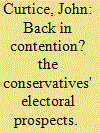

|
|
|
|
|
| Publication |
2009.
|
| Summary/Abstract |
This article assesses whether the Conservatives are likely to be serious contenders for power at the next British general election. First it assesses how well the party will have to do to 'win' the election. Second, it considers whether the record of the polls since 2005 suggests the party is capable of securing the necessary support. Third, the article assesses whether the ideological mood of the electorate has moved closer to the Conservatives since 2005. Finally it considers whether the image of the party has improved.
The Conservatives are likely to have to outpoll Labour by a considerable margin to become the largest party but their record in opinion polls suggests they could achieve this. The ideological mood of the electorate has moved closer to the party, while David Cameron is a relatively popular leader. But the party has still not fully restored its reputation for economic competence.
|
|
|
|
|
|
|
|
|
|
|
|
|
|
|
|
| 2 |
ID:
092378
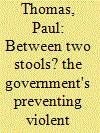

|
|
|
|
|
| Publication |
2009.
|
| Summary/Abstract |
The 7/7 London suicide bombings of July 2005 and numerous subsequent Islamist terror plots have highlighted the reality of an 'internal' threat to Britain. One governmental response has been the 'Preventing Violent Extremism' (PVE) programme. Whilst the educational aspect of its focus on Muslim young people is to be welcomed, there are serious concerns as to whether PVE policy, as currently designed, is falling between two stools. To date, the programme focuses exclusively on Muslim communities in flat contradiction to the integration policy priority of community cohesion, so risking further defensiveness from Muslim communities and resentment from white working class communities. Whilst ignoring the right-wing extremism growing in some of those white communities, PVE work with young people is actually failing to engage openly and robustly with the real political issues driving Muslim anger and minority extremist support. The confidence, understanding and skills of educational practitioners are vital here.
|
|
|
|
|
|
|
|
|
|
|
|
|
|
|
|
| 3 |
ID:
092376
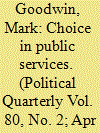

|
|
|
|
|
| Publication |
2009.
|
| Summary/Abstract |
Choice, diversity and personalisation have been key to the New Labour project in public services. With the emergence of a reinvigorated Conservative party as a credible electoral threat, and the end of the Blair era, it seems appropriate to consider the continuing viability and longevity of the New Labour public service project. In this article, I approach the issue of choice in public services through an examination of the long-running controversy over choice in the English secondary school system. I argue that the opponents of choice have been reluctant to engage with the notion of choice in public services due to concerns over the supposed negative effect that consumer choice has on the equity and quality of service provision. This paper aims to challenge the claim that any element of choice in education necessarily has deleterious effects on social justice. I argue that the case against school choice has not been decisively made and that school choice can, in principle, form part of a socially progressive educational project by redistributing power to service users and helping to maintain popular support for public provision of education.
|
|
|
|
|
|
|
|
|
|
|
|
|
|
|
|
| 4 |
ID:
092369
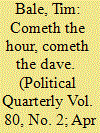

|
|
|
|
|
| Publication |
2009.
|
| Summary/Abstract |
While one can overstate the extent to which the Conservative party has changed since 2005, especially in the light of its response to the recession, the upturn in its electoral prospects is undeniable. Not surprisingly, the Conservative leader, David Cameron, is widely credited with turning around his party's fortunes. In fact, he started with several advantages over his predecessors: New Labour was well past its prime; the economy was running into trouble; and an increasingly desperate Conservative party was more willing to listen to the message that it needed to modernise and moderate. That said, Cameron has been crucial. His communication skills are unparalleled. Early success bought him time and 'permission to be heard'. Most important though, has been his determination-despite media criticism-to stick with a staged strategy focused on conveying change and a move to the centre ground while at the same time reassuring and dividing the Tory right.
|
|
|
|
|
|
|
|
|
|
|
|
|
|
|
|
| 5 |
ID:
092364
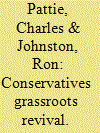

|
|
|
|
|
| Publication |
2009.
|
| Summary/Abstract |
Healthy party grassroots constituency organisations play an important part in modern electoral campaigning, especially in marginal seats, and political parties try to concentrate their efforts on those closely contested constituencies. Recent evidence on party fund-raising at a local level shows that the Conservatives have taken considerable strides in supporting their campaign organisations in marginals, and have done so in a way which enhances their long-term campaigning potential there. The party's grassroots organisations are increasingly well-resourced, especially in the seats the Conservatives need to win back if they are to win the next General Election. However, while fund-raising suggests a healthy grassroots where it is needed, party membership data highlights continued problems for the party.
|
|
|
|
|
|
|
|
|
|
|
|
|
|
|
|
| 6 |
ID:
092373
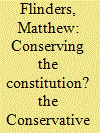

|
|
|
|
|
| Publication |
2009.
|
| Summary/Abstract |
In 2008 David Cameron declared that the Conservative party was 'ready for government' and suggested that 'the change we need is not just from Labour's old policies to our new policies… It's about a change from old politics to new politics'. This 'new politics' narrative is something of a cliché: British constitutional history reveals a regular pattern whereby opposition parties renege upon implementing far-reaching constitutional and democratic reforms once they win power. It is in this context that this article draws upon documentary analysis and a number of interviews to examine the Conservative party's position on constitutional reform and democratic renewal. It concludes that although the Conservative party has spent the last decade decrying the 'destruction' of the constitution it has undertaken little detailed preparatory work in relation to how it might seek to alter the governance of Britain. As a result the research presented in this article provides a number of insights into elite politics, strategic game-playing and executive veto capacities within a context of growing political disengagement from politics and falling levels of trust in politics.
|
|
|
|
|
|
|
|
|
|
|
|
|
|
|
|
| 7 |
ID:
092365
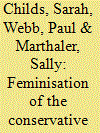

|
|
|
|
|
| Publication |
2009.
|
| Summary/Abstract |
Under David Cameron's leadership reforms have been made to the Conservative party's parliamentary selection procedures and distinct women's policy initiatives have been developed. This article, based on focus group data with party members, explores attitudes towards measures designed to recruit more women Conservative MPs. Broadly, we find that, despite widespread support for the principle of greater social diversity among PPCs, members are uncomfortable with the specific measures that have been introduced. This is largely on the grounds that anything approaching 'positive discrimination' should be eschewed in favour of the 'meritocratic' selection of candidates. Further, the members tend to resent central party 'interference' in what has traditionally been the domain of local Constituency Associations.
|
|
|
|
|
|
|
|
|
|
|
|
|
|
|
|
| 8 |
ID:
092372
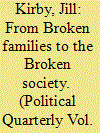

|
|
|
|
|
| Publication |
2009.
|
| Summary/Abstract |
This article traces the development of the Conservative party's 'broken society' narrative, from its roots in William Hague's early invocations of 'social justice' to the evidence-based approach adopted by David Cameron. It considers relevant social trends over the period since 1970; summarises the Conservative party's attitude to family policy in government between 1979 and 1997; and shows how the Conservatives in opposition from 1997 onwards have become more focused on support for the marriage-based family, now a central tenet of Conservative social policy under David Cameron's leadership.
|
|
|
|
|
|
|
|
|
|
|
|
|
|
|
|
| 9 |
ID:
092363
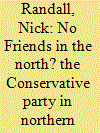

|
|
|
|
|
| Publication |
2009.
|
| Summary/Abstract |
Having won just 19 of 162 seats in northern England at the 2005 general election, the Conservative party under David Cameron's leadership has made an electoral revival in the north of England a particular priority. This article first outlines the Conservatives' post-war electoral record in the north and considers the significance of northern England to the party's strategy at the next general election. It then moves on to examine the potential for socio-economics, identity, memory, ideology and party organisation to frustrate its current ambitions for revival. Finally, it outlines and evaluates the initiatives which the party has undertaken in the north of England since 2005.
|
|
|
|
|
|
|
|
|
|
|
|
|
|
|
|
| 10 |
ID:
092367
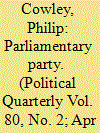

|
|
|
|
|
| Publication |
2009.
|
| Summary/Abstract |
The Conservative parliamentary party will fulfill three important functions for any incoming Conservative government: it will be the focus of attention for the national media; it will be the bulk vote that will deliver its legislative programme; it will form the talent pool from which members of any incoming government will be recruited. A majority Conservative government could see a majority of its MPs newly elected, with more Conservative women and ethnic minority MPs than ever before (although there will be little change in the socio-economic background of their MPs). These new MPs will present problems in terms of party management, although they will be less likely to rebel than longer-serving MPs. There are also relatively few signs of discontent among incumbent Conservative MPs (the article identifies the most rebellious Conservative MPs). Any new Conservative government will also have to deal with a reformed House of Lords, in which it will no longer have a majority.
|
|
|
|
|
|
|
|
|
|
|
|
|
|
|
|
| 11 |
ID:
092375


|
|
|
|
|
| Publication |
2009.
|
| Summary/Abstract |
Upon becoming Conservative leader, David Cameron, and his Shadow Chancellor, George Osborne, initially sought to compete with Labour by pledging increased expenditure on education and the NHS, and thereby insisting that tax cuts would have to wait. Rather than cutting taxation overall, the emphasis was on restructuring and simplifying Britain's tax system, and shifting the burden towards the better off, mainly thorough promoting environmental taxes. However, the economic collapse at the end of 2008 has prompted the Conservatives to modify this new economic stance, by insisting that they will no longer match Labour's planned increases in public expenditure, but, instead, will increase it at a lower rate. This is intended to reduce the need to increase government borrowing during the recession, and thereby ensure that when the economy recovers, the proceeds of economic growth can be shared between higher public expenditure and lower taxation, rather than being spent on repaying government debt for many years ahead.
|
|
|
|
|
|
|
|
|
|
|
|
|
|
|
|
| 12 |
ID:
092370
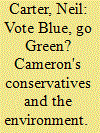

|
|
|
|
|
| Publication |
2009.
|
| Summary/Abstract |
How genuine is the Conservative party's rediscovery of the environment? Would a Conservative government led by David Cameron implement a wide-ranging and progressive environmental policy? This article explores why Cameron has embraced the environment so enthusiastically when Conservative governments have had a poor record of environmental protection and the Conservative party has traditionally shown little interest in the issue. It assesses the impact of Cameron's strategy both on his own party and on the wider world of environmental politics and it evaluates the continuing commitment of the Conservatives to the issue by assessing what kind of policies a future Conservative government might implement. Although Cameron remains committed to the issue and he has already had a positive impact on Labour government policy, he has not yet convinced his party or its supporters, so a future Conservative government would probably represent continuity rather than significant change in environmental policy.
|
|
|
|
|
|
|
|
|
|
|
|
|
|
|
|
|
|
|
|
|